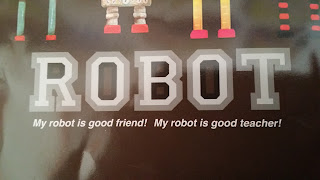We share photos of English language that either does not mean what the writer thought it means, or it does not mean anything at all, and then we use these examples to teach correct English.
Sunday, August 23, 2015
That's offensive.
Disclaimer: we censored this photo.
This is a vending machine on a street in Wonju, Gangwon Province, South Korea. We recommend that tourists always stop and take a look, because these vending machines usually have peculiar items in them. For example, we've seen lingerie for sale in one of these. And, again, these are not indoors, but on the street where children walk by.
This particular vending machine caught our attention because of the belt buckle at the bottom. Most Koreans probably don't understand the meaning and probably don't know that this phrase is offensive. On the other hand, profanity in Korea, at least by Koreans, seems more acceptable in more locations, in front of children, and even from children.
Also, this belt buckle is not unique. It is not uncommon to see Koreans out in public wearing hats and shirts with English profanity. Again, this could be a mix of misunderstanding and greater acceptance, but some of it is offensive. Much of it is meaningless, due to mistranslations, but sometimes you'll find something more like this belt buckle.
Tuesday, August 11, 2015
May I have you?
This is from an English workbook for young Korean learners. Because the waiter in this illustration is speaking to two people at a table, "may I help you" is the correct choice. The other choice, "may I have you," is a request for sexual intercourse. As you can see, the elementary school student first picked the inappropriate second choice, which is why that second option does not belong in this book. The writers and publishers really should have thought of something else.
Sunday, July 26, 2015
My robot is good teacher?
This is the cover of a notebook. Sadly, this is one of many, many notebook styles in Korea that is used by English students even though the English expressions on the front and back covers always have errors.
Koreans often omit the articles "a," "an," or "the," because these articles do not exist in the Korean language. However, the English language requires them. Therefore, the sentence "my robot is good friend" should be "my robot is a good friend" and the sentence "my robot is good teacher" should be "my robot is a good teacher."
Sunday, July 12, 2015
Show the "ghetto power?"
"The four elements of the street culture together always will show the ghetto power" should instead be written "together, the four elements of the street culture will always show the ghetto power." Sadly, other than being correct English, this still doesn't make any sense. What are the four elements of street culture? What is ghetto power? We don't know.
Saturday, June 27, 2015
A skank eats cheese?
There can be a big difference between using the letter "a" and the letter "u", or, in this case, a letter "u" that looks too much like a letter "a." A "skunk," which this word is supposed to be, is an animal. A "skank," which this word is not supposed to be, in an insult that one person might call another.
Thursday, June 18, 2015
Visit to a... what?!?!?
This is an actual medical bill for visiting a doctor. Unfortunately, the doctor's first initial is "A" and his family name is "Dick," and calling someone "a dick" is an insult.
If only someone had reviewed this, the best alternative would probably be to use his full first name, instead of the initial "A," plus the prefix "Dr." A visit to "Dr. Alfred Dick" or "Dr. Abraham Dick" or "Dr. Alex Dick," or whatever his name is, would be highly preferable to just "Visit to A Dick."
Monday, June 8, 2015
We never sicken with love twice.
"Love sick" is an English idiom, but it is used as a state of being, not as a process. Someone can be love sick, in which case he or she loves someone else very much, but someone does not "become sick" or "sicken" with love. A better way of writing this would be: "No, we are never stricken with love twice."
The second sentence, "Cupid spends no second arrow on the same heart," sounds very nice and is rather poetic.
A third sentence, above these, simply needs punctuation and one letter capitalized: "If you would be loved, love and be lovable."
Subscribe to:
Posts (Atom)






